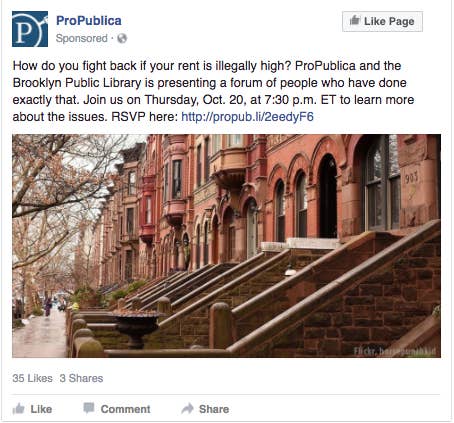
One of Facebook's most appealing traits to advertisers is its ability to target users based on their interests and demographics. On the flipside, the site also gives advertisers the choice to hide ads from specific groups of users, a tactic called exclusion marketing. And this option can lead to unexpected and even unwanted results. A ProPublica report has found has found that Facebook allows advertisers to exclude certain “ethnic affinities” from their ad audiences.
Targeting specific portions of the population is one of the pillars of the digital advertising industry, but it has legal limits. The federal government's Fair Housing Act of 1968 prohibits ads for housing and employment to exclude anyone based on race, gender, and other identities. On Facebook, advertisers may have a way to skirt this rule.
ProPublica was able to create a housing-related ad that excluded anyone with an African-American, Asian-American, or Hispanic "affinity." Rather than limiting your audience to the groups you select, Facebook's targeting options explicitly allow you to exclude specific groups while creating an ad. Facebook approved ProPublica's ad within 15 minutes.
A Facebook spokesperson told BuzzFeed News that ProPublica's ad is for an event, not a housing advertisement, and that the screenshot the investigative journalism nonprofit included in its article was not the ad that was eventually posted. (It appears ProPublica's screenshot is of the ad on the backend of the site, before it posted publicly.) The spokesperson said this is the ad in its final form:

Facebook did not specify whether the ad excludes certain "ethnic affinities," as ProPublica says it does.
The distinction Facebook makes between an ad for housing and one for an event about housing — and whether each allows for exclusion — is murky.
The company said in a prepared statement, "We believe that multicultural advertising should be a tool for empowerment...Marketers use [exclusion targeting] to assess whether ads resonate more with certain audiences vs. others."
Facebook reiterated in the statement that its advertising policies prohibit discriminatory ads. Users can also modify their ad preferences to not include "ethnic affinity" advertising. According to ProPublica, a Facebook said that "ethnic affinity" is not the same thing as race, though he did not quite define what it actually is.
In regards to that enforcement, the spokesperson said Facebook would take down an ad "if the government agency responsible for enforcing discrimination laws tells us that the ad reflects illegal discrimination." But the company doesn't seem to have a way to screen these ads beyond relying on reports from government agencies.
Facebook also pointed to advertisers' targeting practices as evidence of the necessity of the "ethnic affinity" categorization: "All major brands have strategies to speak to different audiences with culturally relevant creative." The company cited "hair products for African-Americans, ads for Spanish beer" as examples of products that would take advantage of "ethnic affinity" targeting.
Facebook also does not require users to specify their race when entering their personal information, so it bases the "ethnic affinity" categorizations on users' "declared interests or the Pages that they like," Facebook wrote in a prepared statement.
